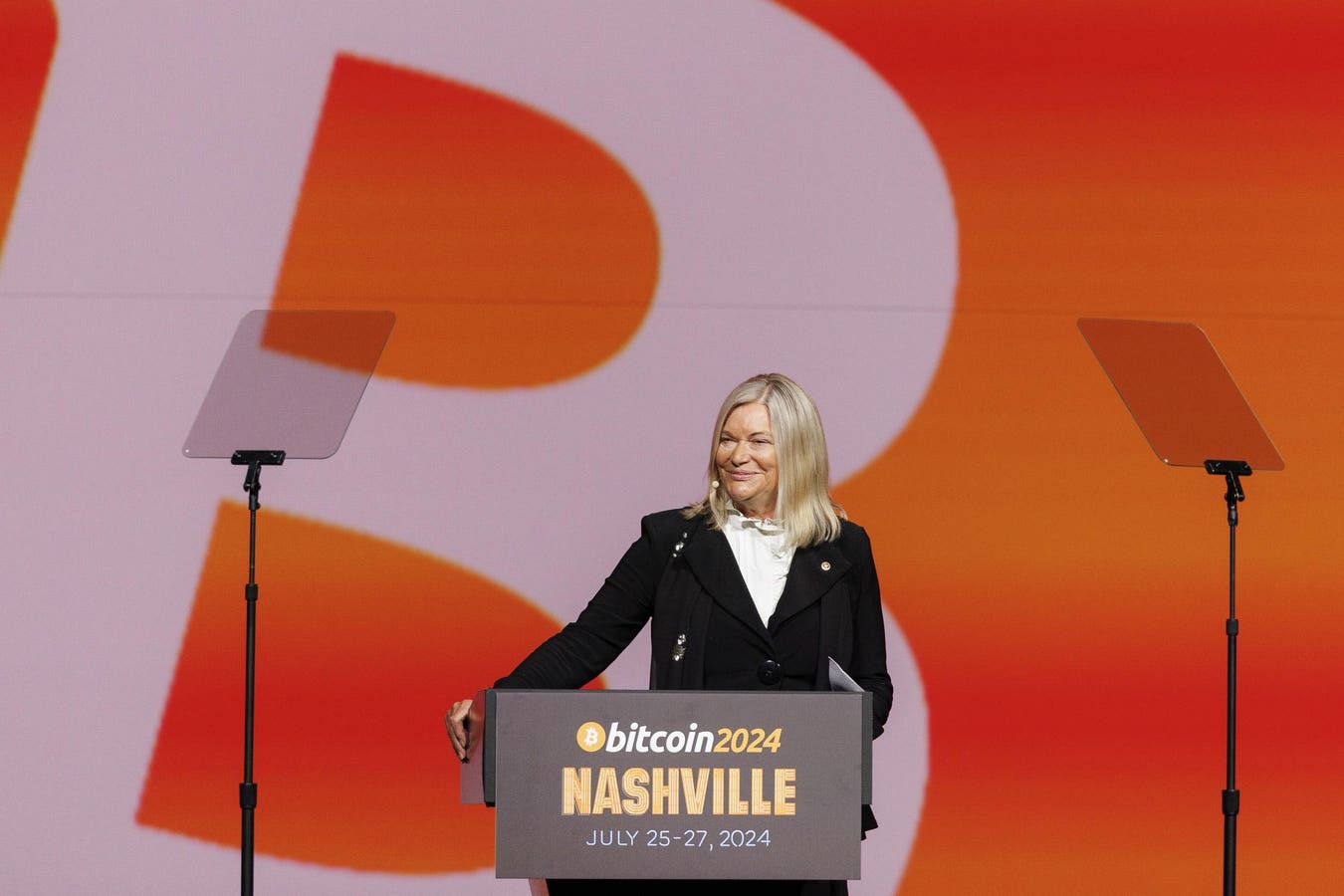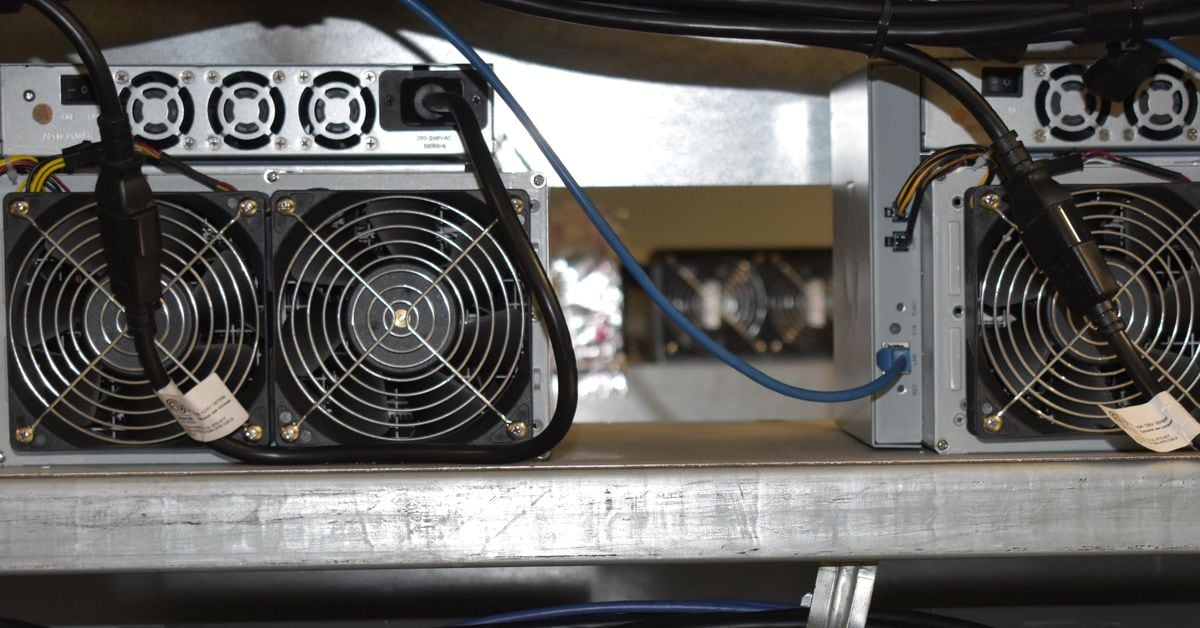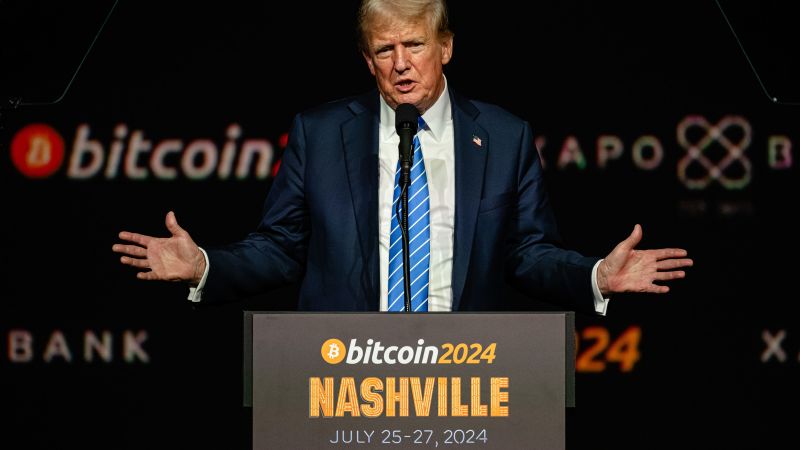Bitcoin
No, Bitcoin Will Not Solve Our National Debt

Wyoming Republican Senator Cynthia Lummis speaks at the Bitcoin 2024 conference in … [+] Nashville, Tennessee, U.S., on Saturday, July 27, 2024. Former U.S. President Donald Trump said he would fire the chairman of the Securities and Exchange Commission and pick crypto-friendly regulators if he returns to the White House in a bid to woo virtual currency enthusiasts and capitalize on the industry’s growing influence in the political arena. Photographer: Brett Carlsen/Bloomberg
© 2024 Bloomberg Finance LP
At a Bitcoin conference last weekend, Senator Cynthia Lummis (R-Wyo.) announced future legislation that would direct the Treasury to purchase 1 million Bitcoin, or roughly 5% of the global supply, over five years (which would cost between $60 billion and $70 billion at today’s prices). Lummis claimed that the federal government would be “debt-free because of Bitcoin” if his proposal were to pass, because these Bitcoins could be sold by the federal government at a profit after 20 years. Unfortunately, there are mathematical and conceptual problems that prevent such an approach from solving the federal government’s budget problems.
Let’s start with the math: US National Debt Today stands at nearly $28 trillion (or $35 trillion if you include the “intragovernmental debt” that the general fund owes to other internal government accounting entities, such as the Social Security and Medicare trust funds). This year alone, the federal government spent about $2 trillion more than it took in in revenue, which had to be covered by borrowing money that adds to our national debt.
In comparison, the total market capitalization of Bitcoin today (which is the total number of Bitcoins in existence multiplied by their current market price) is only about $1.3 trillion — and that’s with Bitcoin’s current price near its all-time high. If all the Bitcoin in the world isn’t worth enough to cover a single year’s budget deficit, there’s no way buying 5% of it could plausibly stem the growth of, let alone pay off, our national debt. For the math to work, Bitcoin’s market cap would have to reach a level that is a multiple of the annual economic output of the entire planet (the International Monetary Fund current estimates the sum of each country’s gross domestic product is less than US$110 trillion).
But beyond the math, there are serious conceptual problems with Lummis’s proposal as a partial solution. When the government acquires an asset, it is typically reallocating rather than creating wealth. As the government buys some of the existing supply of Bitcoin, it would reduce the remaining supply available for others to buy on the market. If private demand for Bitcoin remains constant, the result would be an increase in the price of one Bitcoin. The beneficiaries of this transaction would be the current owners of Bitcoin (one of whom is Senator Lummis herself), because they would be in possession of an asset that can be sold at a higher price than the price at which it was originally purchased.
The increase in Bitcoin’s price, and thus the financial benefit to current holders, is likely to be even greater because, rather than remaining constant, private demand would increase as previously cautious investors view the U.S. government’s investment as an indicator of the digital asset’s legitimacy. These higher prices would not only increase demand for Bitcoin, but could also encourage Bitcoin “miners” to increase supply. Bitcoin mining is a extremely energy intensive process that relies on advanced graphics processing units (GPUs). If Bitcoin mining increases demand for GPUs, the GPUs themselves will become more expensive, as they did in 2020. In turn, every activity that depends on GPUs — from video editing to gaming — will also become more expensive.
Perhaps most alarmingly, a boom in Bitcoin mining threatens to stifle promising developments in artificial intelligence (AI). As other Forbes contributors point out, he wroteAI has the potential to revolutionize our economy and boost the productivity of our workforce in countless ways that would increase real wealth for Americans of all socioeconomic backgrounds. But AI also relies on advanced GPUs to function, of which there are already there is not enough supply to meet demand. It would be a profound failure of federal policy to make AI advances more costly to achieve by encouraging people to spend the resources needed to generate digital tokens. Furthermore, even if federal government Bitcoin purchases do not lead to an increase in Bitcoin mining, there are still other ways in which rising Bitcoin prices would displace productive economic investment — but rather than delve into them here, I recommend reading this great 2022 article by Josh Barro about the subject.
For these and other reasons, the federal government should not take any action to push the price of Bitcoin — or any other cryptocurrency, for that matter — above the level set by the free market. If policymakers believe that prices will continue to rise anyway and want to capture some of that value for deficit reduction, there are much better mechanisms for doing so. For example, a capital gains tax increase could aim to capture 5% of the gain on 100% of Bitcoin rather than capturing 100% of the gain on 5% of Bitcoin, as the Lummis proposal would seek to do. In addition to avoiding the market-distorting effects of the Lummis proposal, this approach has the added benefit of not leaving taxpayers holding the bag if the value of Bitcoin plummets, as then many other cryptocurrencies have done.
When it comes to dealing with our national debt, there is no substitute for cutting spending and/or raising taxes. There are no quick fixes here — policymakers must accept tradeoffs and make hard choices about how to allocate limited resources. Fortunately, my team at the Progressive Policy Institute recently published a serious package of proposals that deals with these tradeoffs to put the federal budget on a path to balance within 20 years. Even adopting half of our recommended savings would allow policymakers to keep debt from growing faster than our economy, which is what most economists consider to be the measure of fiscal sustainability. And ours is just one framework: six other think tanks published their own plans to stabilize the debt last week (and notably, none of them proposed spending up to $70 billion of taxpayer funds on Bitcoin).
To Senator Lummis’s credit, she has also supported efforts to promote serious solutions like these in the past. As a member of the U.S. House of Representatives in 2012, Lummis was one of only 38 members who resisted partisan pressure and voted in favor of a congressional budget resolution based on the debt stabilization recommendations of the bipartisan Simpson-Bowles Fiscal Commission. More recently, Lummis was one of nine senators to cosponsor a bill that would establish another bipartisan fiscal commission to generate an updated package of recommendations to stabilize the national debt. It would be a great service to the nation if Senator Lummis would put all her energy into advancing these and other serious efforts to align revenues and spending rather than distracting them with alternative schemes that would merely enrich cryptocurrency investors at the expense of the taxpayer.
Bitcoin
Big Tech Outperforms Bitcoin (BTC) as Trump Deal Weakens Token

Bitcoin has lost out on an asset rally fueled by positive comments from the Federal Reserve, while a tight US election race casts doubt on whether Donald Trump will get the chance to implement his pro-crypto agenda.
The digital asset fell 2.4% on Wednesday, following a Fed-fueled surge in an index of megacap tech stocks Magnificent Seven by one of the largest margins in 2024. The token retreated further on Thursday, changing hands at $63,750 as of 6:10 a.m. in London.
Bitcoin
‘This is huge’ — Billionaire Mark Cuban issues ‘incredible’ Bitcoin and crypto prediction amid price slump

Bitcoin
Bitcoin
came back with a vengeance this year when former President Donald Trump Cryptocurrency boosts US presidential election in November with ‘revolutionary’ plan.
The price of bitcoin has surged to more than its all-time high in recent months, surpassing $70,000 per bitcoin and triggering a wave of mega-optimistic predictions about the price of bitcointhough it fell again this week, falling below $65,000 after the Federal Reserve kept interest rates steady.
Now, as Elon Musk suddenly breaks his silence on bitcoin and cryptocurrenciesBillionaire investor Mark Cuban called a California plan to digitize 42 million car titles using blockchain an “incredible step forward” and “huge” for cryptocurrencies.
Sign up for free CryptoCodex now—A daily five-minute newsletter for traders, investors, and crypto curious people that will keep you up to date and ahead of the bitcoin and crypto bull market
Mark Cuban, famous Shark Tank investor and billionaire owner of the NBA team Dallas Mavericks, has… [+] called a cryptocurrency update “amazing” amid bitcoin’s price slump.
Getty Images
The California Department of Motor Vehicles (DMV) has digitized 42 million car titles using blockchain, it was reported by Reuters, through technology company Oxhead Alpha on the Avalanche blockchain and designed to detect fraud and facilitate the securities transfer process.
“This is an incredible development for crypto,” Cuban, best known as an investor on TV’s Shark Tank and owner of the Dallas Mavericks NBA team, posted on X, joking that U.S. Securities and Exchange Commission (SEC) Chairman Gary Gensler could sue the state as part of his hostility toward cryptocurrencies and blockchain technology.
“The reason this is huge for crypto is because people who hold the tokens will have an app with an Avalanche wallet,” Cuban said. “Tens of millions of Californians having and using a crypto wallet in the next five years, or however long it takes, normalizes the use of wallets and crypto.”
John Wu, president of Avalanche developer Ava Labs, told Reuters that California’s DMV is “creating a wallet that you can download on your phone.”
Sign up for CryptoCodex now—A free daily newsletter for the crypto-curious
Bitcoin’s price has rallied this year, triggering a wave of bullish bitcoin price predictions from… [+] people like billionaire Mark Cuban.
Forbes Digital Assets
Last month, Cuban predicted that if the US dollar falls as the global reserve currency, bitcoin could become “a global ‘safe haven’” and a “global currency.” potentially sending the price of bitcoin to a much higher level.
According to Cuban, bitcoin could become what its most ardent supporters “envision” — a means “of protecting our economies… This is already happening in countries facing hyperinflation.”
The price of bitcoin has skyrocketed over the past year, largely due to the world’s largest asset manager, BlackRock, leading a bitcoin attack on Wall Street.
Bitcoin
Bitcoin (BTC) miner Riot Platforms (RIOT)’s second-quarter loss widens to $84.4 million as costs rise

Please note that our Privacy Policy, terms of use, cookiesIt is do not sell my personal information Has been updated.
CoinDesk is a awarded media outlet that covers the cryptocurrency industry. Its journalists follow a strict set of editorial policies. In November 2023, CoinDesk has been acquired by the Bullish group, owner of Optimistica regulated digital asset exchange. The Bullish Group is majority owned by Block.one; both companies have interests CoinDesk has a portfolio of blockchain and digital asset businesses and significant holdings of digital assets, including bitcoin. CoinDesk operates as an independent subsidiary with an editorial board to protect journalistic independence. CoinDesk employees, including journalists, may receive options in the Bullish group as part of their compensation.
Bitcoin
Why Trump Wants the US Government to Have a “National Stockpile” of Bitcoin

At a national bitcoin conference in Nashville, Donald Trump finally laid out some of his crypto policy proposals, including a long-awaited part of his plan — building a strategic bitcoin reserve. CNN’s Jon Sarlin explains what it is and why the crypto industry wants it.
-

 News12 months ago
News12 months agoBitcoin soars above $63,000 as money flows into new US investment products
-

 DeFi12 months ago
DeFi12 months agoEthena downplays danger of letting traders use USDe to back risky bets – DL News
-

 News12 months ago
News12 months agoFRA Strengthens Cryptocurrency Practice with New Director Thomas Hyun
-

 DeFi12 months ago
DeFi12 months agoZodialtd.com to revolutionize derivatives trading with WEB3 technology
-

 Markets12 months ago
Markets12 months agoBitcoin Fails to Recover from Dovish FOMC Meeting: Why?
-

 DeFi1 year ago
DeFi1 year ago👀 Lido prepares its response to the recovery boom
-

 Markets1 year ago
Markets1 year agoWhale Investments in Bitcoin Reached $100 Billion in 2024, Fueling Crazy Investor Optimism ⋆ ZyCrypto
-

 Markets1 year ago
Markets1 year agoWhy Bitcoin’s price of $100,000 could be closer than ever ⋆ ZyCrypto
-

 DeFi1 year ago
DeFi1 year agoPancakeSwap integrates Zyfi for transparent, gas-free DeFi
-

 Markets1 year ago
Markets1 year agoWhales are targeting these altcoins to make major gains during the bull market 🐋💸
-

 DeFi1 year ago
DeFi1 year ago🏴☠️ Pump.Fun operated by Insider Exploit
-

 News1 year ago
News1 year agoHow to make $1 million with crypto in just 1 year 💸📈












